
Russian security services know it is easier to tarnish and eliminate a man rather than a movement. Amnesty’s announcement has aided the Kremlin’s desire to incapacitate the most serious challenge to the Putin regime in almost a decade. Now, with Navalny imprisoned and the protests ruthlessly subdued, the regime may be poised for another attempt on Navalny’s life, after the failure of his poisoning last year.
The sixth anniversary, on Feb. 27, of the murder of another Russian opposition leader who fought for a vision of a free and democratic Russia — Boris Nemtsov — provides a sobering reminder of the Putin regime’s willingness to shamelessly eliminate opponents. President Biden’s calling Vladimir Putin a “killer” on Wednesday is being portrayed in some quarters as provocative when it is simply accurate.
Meanwhile, a debate has emerged around Navalny. Some argue that Navalny should receive the Nobel Peace Prize, or compare him to Mohandas Gandhi and Nelson Mandela. By contrast, others question his personal and political beliefs, especially in connection to ethnonationalism and Ukraine. The praise and scrutinyare warranted, but they are distractions.
Holding this debate now puts the cart far in front of the horse. Russians may eventually elect a presidential candidate such as Navalny, but free and fair elections remain on the distant horizon in Putin’s Russia. The issue at hand is whether one is for or against authoritarianism. Supporting Navalny as a political candidate is not a prerequisite for supporting Navalny’s release and a democratic Russia.




